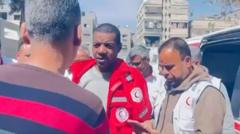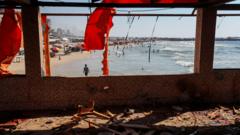After spending 37 days in detention, Gaza medic Assad al-Nassasra has been released by Israeli authorities. His detention came in the aftermath of an Israeli military strike that killed 15 emergency workers, including eight paramedics, prompting international scrutiny and claims of war crimes by the Palestinian Red Crescent Society. While Israel's investigation cited "professional failures," the PRCS condemned it as an attempt to distort the truth and deflect responsibility.
Israeli Military Releases Detained Gaza Medic Amid Controversy Over Emergency Crew Killings

Israeli Military Releases Detained Gaza Medic Amid Controversy Over Emergency Crew Killings
The release of Palestinian paramedic Assad al-Nassasra follows an Israeli military inquiry into the deaths of emergency responders during an attack, sparking debates on accountability and the protection of medical personnel.
The Israeli military has released Palestinian paramedic Assad al-Nassasra following 37 days of detention, according to the Palestine Red Crescent Society (PRCS). His detention followed a tragic incident in southern Gaza last month, where Israeli troops killed 15 emergency workers, including eight paramedics, during an attack while they were responding to an emergency call.
Al-Nassasra was reportedly missing for three weeks before the International Committee of the Red Cross confirmed his detention status. He was among ten detainees freed at an Israeli border crossing on Tuesday. The Israeli military has not elaborated on the circumstances of his release, though it had previously acknowledged holding him during an examination of the incident that resulted in the deaths of the emergency crew.
On March 23, Israeli forces opened fire on a convoy of ambulances, a fire engine, and a UN vehicle in the Tal al-Sultan area of Rafah. The bodies of the emergency responders were later found buried nearby, raising serious questions about the rules of engagement and the protection afforded to medical personnel in conflict zones.
Initial Israeli military statements suggested that the firing was directed at "suspicious vehicles," but these claims were contradicted by video evidence illuminating the convoy's use of emergency lights. Subsequently, the military characterized the shooting as an "operational misunderstanding" by troops who perceived a tangible threat from the responding vehicles. The inquiry that followed expressed that there was an overall failure in command protocols, leading to the dismissal of the deputy commander involved.
The Palestinian Red Crescent sharply criticized the Israeli report, calling it "full of lies" and accusing Israel of systematically distorting the truth to shield its military from accountability for what they describe as war crimes. They further suggested that such investigations perpetuate a narrative aimed at demonizing Gaza's medical personnel as being allied with Hamas, thereby justifying the attacks on those bearing the protective emblems of humanitarian work.
A senior UN humanitarian official emphasized the broader implications of a lack of accountability, warning that it undermines international law and endangers future humanitarian efforts. The complexities surrounding the Gaza-Israel conflict continue to highlight the deepening challenges faced by medical teams working in volatile environments, as fatal incidents provoke additional scrutiny of military engagement guidelines.



















